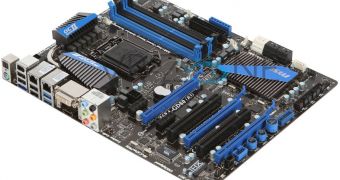Even though nobody can deny the fact that Intel's Sandy Bridge architecture has brought a numerous number of improvements to CPU design, the same thing can't be said about the chipsets that were built to support these processors. This is why a numerous number of users interested in such a system have been keenly awaiting for the Z68 PCH to arrive, which we now know it will be officially launched on May 8.
When it introduced Sandy Bridge to the world at the beginning of January Intel has also pushed out two chipsets for its LGA 1155 platform, the P67 and the H67.
Although both were based on the same Cougar Point PCH their functionality was quite different as the first one packed CPU and memory overclocking support but lacked the FDI interface that was required for using the Sandy Bridge integrated graphics while the latter featured FDI support but lacked any CPU overclocking functions.
Normally, this wouldn't be such a problem as high-end systems usually come with dedicated graphics, but Sandy Bridge brought to the table a new feature that is called Quick Sync.
This is a part of the Intel HD on-die GPU and it significantly speeds up video transcoding tasks with almost no image quality loss.
The catch was that for using this technology consumers had to go with the Sandy Bridge integrated graphics, something that wasn't possible with a P67 motherboard so those who wanted to take advantage of the technology had to give up on overclocking and go with a H67 board.
To make Quick Sync even more interesting, shortly after its introduction, Lucidlogix had developed a special driver which allowed for on the fly switching between the Sandy Bridge integrated GPU and a discrete graphics card as long as a FDI interface was available.
This got even more consumers interested in Quick Sync since they could now use the on-die GPU for transcoding video and the dedicated GPU for playing games and running other graphics heavy tasks.
Sadly, this meant that they has to go with H67, so Intel developed a chipset that would allow for CPU overclocking while also packing an FDI interface.
The name of this new PCH is Z68 and, alongside these features, it also comes with a SSD caching function, called Smart Response by Intel, which can speed up systems that use a small SSD together with an HDD unit by merging the two into an hybrid storage drive.
The Intel Z68 Express chipset is expected to become official on May 8 or 9, depending on the time zone you live in, and a recent report seems to suggest that its pricing will be similar with that of the P67. (via Nordic Hardware)

 14 DAY TRIAL //
14 DAY TRIAL //